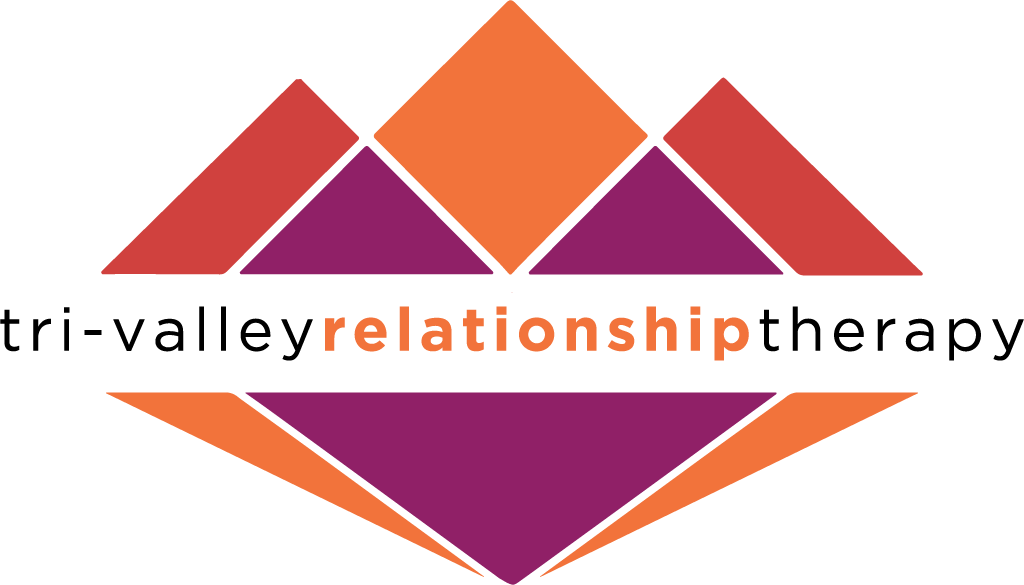Counseling & Therapy For Anxiety
Tri-Valley Relationship Therapy, Inc. in Dublin & Oakland offers individual therapy including CBT for anxiety related problems.
Anxiety is good! In moderation…
Anxiety and fear is a normal human response of the sympathetic nervous system, the part of our brain that alerts us to potential danger. Anxiety is the feeling of apprehension about an anticipated problem whereas fear is a much more immediate reaction to danger. Neither one is necessarily a bad response and are actually quite adaptive. Anxiety helps us plan for future threats by being prepared and think through problems before they occur. Fear triggers our fight-or-flight responses in dangerous situations and can actually save our life.
Too much anxiety is paralyzing
However, anxiety & fear become maladaptive when our brain (sympathetic nervous system) starts to misfire: we begin to experience anxiety & fear in the ABSENCE of any real or anticipated danger or problem. The excessive, uncontrollable & unnecessary anxiety constitutes an anxiety disorder. In my individual counseling practice at The Tri-Valley Center for Relationship Therapy, I have worked with many clients struggling with various anxiety related problems. The impact of anxiety is not limited to personal distress. Anxiety causes problems in interpersonal & social relationships, work productivity & satisfaction as well as sexual performance & enjoyment.
Anxiety related conditions
Phobias:
An out of proportion fear of an object or a situation is called a phobia. People with a phobia are usually aware that their fear is irrational or excessive but they make every attempt to avoid the feared situation or object. An example is claustrophobia- the fear of being in an enclosed space such as an elevator or acrophobia- the fear of heights.
Social Anxiety:
Many people experience difficulty with public speaking when they are in front of a large audience. In fact, some of the nervousness that people experience while doing presentations or giving lectures for work or school is actually conducive to better performance because a complete absence of anxiety is problematic for performance. However, when people begin to experience an unrealistic and excessive fear of social situations or being around unfamiliar people, it may be due to social anxiety. As a result, people with social anxiety begin to avoid social situations where they may have to meet new people, talk to people in authority or speak up in meetings. Consequently, the avoidance of social situations begins to disrupt the social and occupational functioning of the effected individual.
Panic Attack:
As the name suggests, a panic attack is a sudden onset of extreme apprehension, feeling of impending doom, terror along with physical symptoms such as chest pain, heart palpitations, upset stomach, sweating, chills etc. It is a misfire of the sympathetic nervous system because the arousal matches the normal response to a dangerous situation but in the absence of any real danger, the symptoms are confusing to the individual, who tries to make sense of them.
Generalized Anxiety:
The central feature of generalized anxiety is out of control worry along with feeling restless, fatigue, difficulty with concentration & focus, insomnia, irritability & mind going blank. People struggling with generalized anxiety often avoid situations that present the possibility of negative outcomes, they struggle with making decisions due to the excessive worry and often seek reassurance due to the worries. In my practice, generalized anxiety is the most common complaint among clients that present with anxiety related symptoms.
How can counseling help?
Exposure:
One of the ways in which phobias can be treated behaviorally is in-vivo or real life exposure to the feared objects. Treatment is usually very brief but highly effective and has been used successfully in fear of animals, injections or dental work.
Role play & social skills training:
Exposure is also extremely effective for social anxiety. However, before being exposed to the actual social situation, role play is used to help the individual struggling with social anxiety, practice being in the social situation by role playing with the therapist in the session or in the context of a small therapy group. Another strategy is social skills training which involves the therapist providing intensive modeling of the social skills needed to navigate the feared social situation. After role play & social skills training, the individual is encouraged to engage in social activities but is asked to not use safety behaviors, by making eye contact and be fully present.
Cognitive Behavioral Therapy (CBT):
The most effective therapeutic intervention for anxiety related issues is CBT which is a combination of cognitive & behavioral techniques. This is also my preferred treatment for anxiety related disorders. In a typical CBT session, with a client struggling with excessive worry, I use behavioral interventions such as relaxation training and cognitive strategies to help people deal with uncertainty which is a source of distress for people with generalized anxiety. I also use other cognitive behavioral strategies such as helping people focus on the present moment, test out their worries by tracking the outcome of the worrying, encouraging people to only worry during scheduled time and uncovering underlying fears that people tend to avoid by engaging in worrying.
Written by: Nagma V. Clark, Ph.D., L.P.C.C. specializing in sex therapy, couples therapy & marriage counseling, premarital counseling, individual relationship therapy & LGBTQQI couples counseling at Tri-Valley Relationship Therapy, Inc. in the East Bay, in Dublin & Oakland.
If anxiety is impacting your interpersonal, social, sexual or occupational functioning, individual counseling & therapy at Tri-Valley Relationship Therapy, Inc. in the East Bay can help. Dr. Clark utilizes the Cognitive Behavioral Therapy (CBT) interventions targeted to manage & alleviate anxiety related distress.
Call 925-400-3541 or email doctor.nvclark@gmail.com to schedule a free 15 minute phone consult or fill out the contact form and you will be contacted within 12-24 hours.

